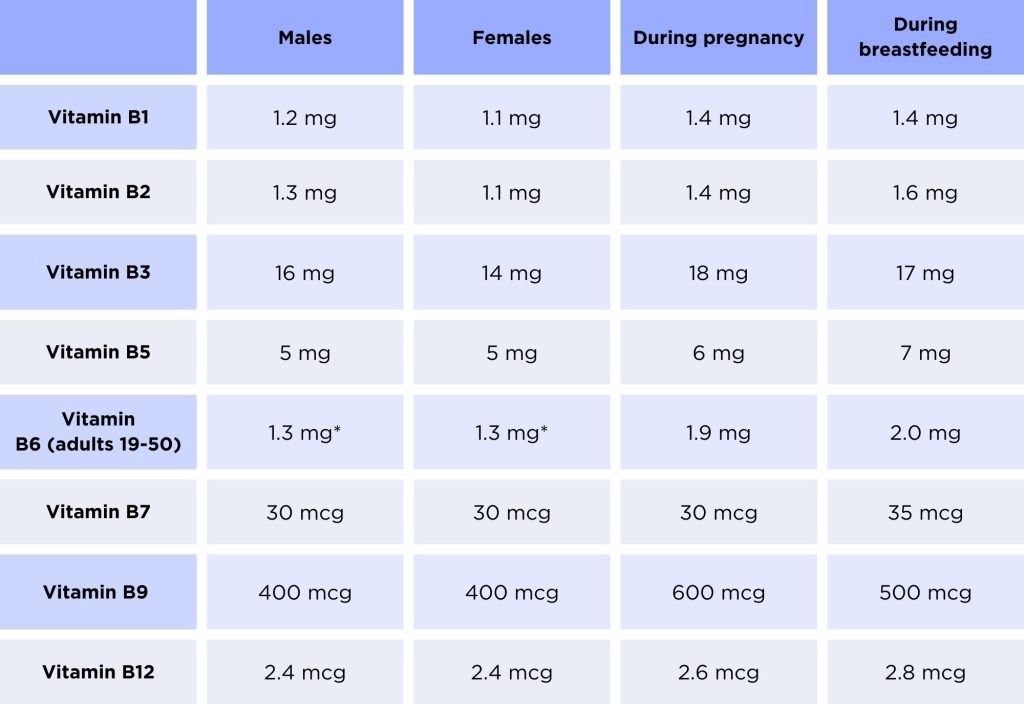Popular by name, famous by its effectiveness. Vitamin B Complex is among the most vital and influential vitamins and minerals. This post will delve into their benefits and food sources and offer step-by-step guides for including them in our daily routines.
By understanding each B vitamin’s significance individually and how they interact together, we can access the full potential of this powerhouse of nutrients and optimize our health.
What is Vitamin B Complex?
The Vitamin B complex is a group of eight water-soluble vitamins that support our health and play essential roles in various bodily functions and processes, from energy production and metabolism to nerve health and brain wellness.
What’s the function of Vitamin B Complex?
B1 (thiamine):
It helps convert carbohydrates into energy and supports nerve function.
B2 (riboflavin):
Essential for energy production and fats, proteins, and carbohydrate metabolism.
B3 (niacin):
It plays a role in energy metabolism and DNA repair and helps maintain healthy skin.
B5 (pantothenic acid):
It supports energy production and synthesizes hormones and cholesterol.
B6 (pyridoxine):
Necessary for amino acid metabolism, neurotransmitter production, and red blood cell formation.
B7 (biotin):
Aids metabolize carbohydrates, fats, and amino acids, promoting healthy hair, skin, and nails.
B9 (folic acid):
It’s essential for DNA synthesis, cell division, and red and white blood cell formation.
B12 (cobalamin):
Vital for red blood cell production, neurological function, and DNA synthesis.
“B Complex vitamins typically work synergistically together”
Characteristics of the B complex vitamins:
1. Water-Soluble
B complex vitamins are water-soluble, meaning they dissolve in water rather than being stored by your body. Excess amounts may be excreted through urine; regular supplementation should be undertaken.
2. Coenzymes
Many B complex vitamins function as coenzymes, assisting enzymes in carrying out crucial chemical reactions in the body. Coenzymes are essential in several metabolic processes, including energy production and food metabolism.
3. Essential Nutrients
B complex vitamins are essential because the body cannot produce sufficient quantities on its own; to get enough, diet or supplementation must provide them in adequate amounts.
4. Interconnected Roles
B Complex vitamins typically work synergistically together, supporting each other’s functions and being involved in similar biological processes and metabolic pathways.
5. Dietary Sources
There are numerous natural food sources that include B complex vitamins; regular consumption would meet the body’s requirements.
6. Vital for overall health:
B complex vitamins play an integral part in maintaining overall health and well-being, from energy production and nervous system functioning to DNA synthesis and red blood cell production, as well as the metabolism of proteins, carbohydrates, and fats.
7. Deficiency risks:
Improper consumption can lead to B complex vitamin deficiencies and result in associated health problems, including fatigue, weakness, neurological symptoms, skin issues, anemia, and impaired cognitive performance.
Note that while individual B vitamins have specific features and functions in our bodies when taken together, they form part of the B complex vitamins, ensuring optimal health in various aspects.
“Vitamin B Complex is beneficial to our health and plays important roles in a variety of biological functions and processes.”
Roles and Benefits of Vitamin B Complex:
Energy production and metabolism support
B vitamins are crucial in converting carbohydrates, fats, and proteins from our diet into energy our cells can use. They are involved in vital metabolic pathways, ensuring the efficient production of ATP, the body’s energy currency.
Nervous system maintenance and cognitive function enhancement
B vitamins help the nervous system produce neurotransmitters (chemicals that send impulses between nerve cells) to improve brain function, memory, and cognition.
Heart Health Promotion and Cholesterol Regulation
B vitamins play an integral part in maintaining cardiovascular system health by helping regulate cholesterol levels, supporting proper blood clotting mechanisms, and supporting the well-being of blood vessels.
B vitamins such as B3, B6, B9, and B12 may help lower homocysteine levels – an amino acid that, when elevated, increases the risk for heart disease and stroke. Supplementing these B vitamins could prevent or manage cardiovascular conditions more effectively.
Mood regulation and emotional well-being
B vitamins are integral to maintaining mental health and emotional well-being, especially B6, B9, and B12 are necessary to produce neurotransmitters, including serotonin, dopamine, and GABA, which regulate mood. Therefore they are associated with reduced rates of depression and improved mood and may relieve depression or anxiety symptoms.
Skin, hair, and nail health improvement
B vitamins significantly improve the health and appearance of our skin, hair, and nails. They are integral to cell regeneration, collagen production, and overall skin integrity maintenance.
Biotin (B7) promotes healthy hair, skin, and nails: therefore, it is commonly included in beauty supplements and products. Other B vitamins like B3 and B5 also play an integral part in maintaining skin health by supporting a flawless complexion, decreasing inflammation levels, and aiding wound healing processes.
Red blood cell formation and oxygen transport
B vitamins are necessary for producing red blood cells that carry oxygen throughout the body, keeping your vascular system functioning normally and helping you avoid conditions like anemia.
Immune system support and inflammation reduction
B vitamins aid in inflammation reduction. They modulate immune cell activities to optimize immunological responses. They may reduce chronic inflammation linked to cardiovascular disease, diabetes, and autoimmune illnesses.
B6, B9, and B12 boost immune cell development and activity, helping us fight infections and disorders.
Hormone regulation and stress management
B vitamins are integral in producing and regulating stress hormones and the stress response, supporting hormonal balance, and alleviating PMS/menopausal symptoms. Achieving adequate B vitamin levels is critical to supporting hormonal equilibrium, including cortisol synthesis, and may even help ease some symptoms associated with hormonal imbalance, including PMS and menopausal symptoms.
Food Sources of Vitamin B Complex
Nature has given us so much, and B vitamins are abundantly found in food and nutrition systems, making it simple to incorporate them into our diets. Below are some excellent food sources of each B vitamin:
Thiamin (B1) It’s found in whole grains, legumes, nuts, and fortified cereals.
Riboflavin (B2) It’s found in dairy products, lean meats, leafy green vegetables, and fortified cereals.
Niacin (B3)It’s found in poultry, fish, whole grains, legumes, and nuts.
Pantothenic Acid (B5) It’s found in meat products, whole grains, avocados, and mushrooms.
Pyridoxine (B6) It’s found in poultry, fish, bananas, spinach, and chickpeas.
Biotin (B7) It’s found in egg yolks, nuts, seeds, sweet potatoes, and cauliflower.
Folate (B9) It’s found in leafy green vegetable legumes, citrus fruits, and fortified grains.
Cobalamin (B12)It’s found in meat, poultry, fish, dairy products, and fortified plant-based milk products.
So many choices to choose from; adding a diverse range of these nutrient-rich foods into your meals can help meet your daily B vitamin requirements. And naturally, increase your intake of it if necessary.
“chronic alcoholism or kidney disease increases their risk for B vitamin deficiencies”
Who should take B complex vitamins?
B complex vitamins can be helpful for individuals who may have nutritional deficiencies or specific requirements, including:
Vegans and Vegetarians.
Senior Citizens.
Individuals with digestive disorders.
Pregnant and breastfeeding women.
Individuals with certain health conditions: Individuals suffering from conditions that affect nutrient absorption, such as gastritis or gastric bypass surgery, may benefit from supplementing B complex vitamins. Furthermore, chronic alcoholism or kidney disease increases their risk for B vitamin deficiencies.
Recommended Dosage and Supplementation
According to the National Institutes of Health, the recommended daily dosage of B complex vitamins depends on age, sex, health status, and personal needs.

“Vitamin B12 deficiency, in particular, may increase your risk of neuropsychiatric disorders”
The danger of Vitamin B deficiency
If you’re deficient in B vitamins, you may experience various symptoms, depending on which B vitamins you lack.
If left untreated, a deficiency could increase your risk for:
anemia
digestive issues
skin conditions
infections
peripheral neuropathy
Vitamin B12 deficiency, in particular, may increase your risk of neuropsychiatric disorders. Researchers are also investigating its role in hyperhomocysteinemia and atherosclerosis.
Babies born to individuals deficient in folic acid during pregnancy may be more likely to have specific congenital disabilities.
Some things to consider before you buy Vitamin B Complex
Some products only contain a few, while others combine B vitamins with other vitamins or minerals. Most vitamin B complex products are available over the counter (OTC), but some might require a prescription. Vitamin B complex is typically taken by mouth. But there’s also an injectable version available that a healthcare provider gives.
Different oral vitamin B complex brands can have different combinations and dosages of B vitamins. Some brands might also contain other types of vitamins. Please read the manufacturer label of your product for specific directions.
Several OTC vitamin B complex products contain vitamin C or other vitamins or minerals. If you need help deciding what to buy, ask your pharmacist for help choosing the right product.
When choosing a supplement, choose a reputable brand that provides a balanced combination of B vitamins.
Taking vitamins in the form of liquid drops under the tongue is recommended.
Precautions and Interactions
Dosage Precautions:
While overdosing on B vitamins is possible, it’s unlikely if you follow the directions on your vitamin B complex package as prescribed. Your body usually disposes of extra amounts through urine. Still, too much B vitamin may lead to toxicity.
Always follow the recommended dosage and consult a healthcare professional before starting new supplements.
Usage Precautions:
B complex vitamins are generally safe for most people to take, with certain exceptions, including medications for epilepsy or acid reflux that could interact negatively with B vitamins.
Individuals living with kidney disease or genetic disorders may require particular dosages of B vitamins. It’s wise to consult a healthcare professional who can tailor advice to their unique situation.











